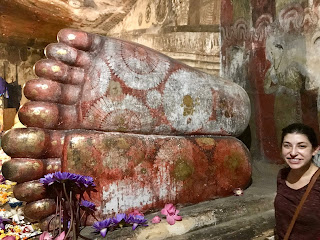The Kingdom of Kandy and the Dambulla Cave Temples
Matt,
here! I decided to give Melanie the night off and will be writing tonight’s
blog post. The focus of this post is Buddhism in Sri Lanka, something that has
really interested me throughout our travels. It’s hard to emphasize how omnipresent
Buddha is in the country. The religion was first introduced to Sri Lanka from
India in the 3rd Century BC. Now over 70% of the Sri Lankan
population identifies as Buddhist.
Melanie
and I quickly lost count of the number of Buddhist symbols and depictions we
saw after maybe the first day, ranging from small and giant statues of the
Buddha to historic white stupas
to monks riding on the back of motorcycles. We’ve also encountered a couple of
intimate religious moments such as one of our drivers pulling over the car
simply to say a quick prayer to a roadside Buddha or how the Buddhist monthly
holiday, Poya, affected meat and alcohol sales one day when we were in Colombo.
As
Melanie mentioned in her last post, our memorable train ride left us in the
central city Kandy. Kandy is home to the Temple of the Tooth,
which is the most significant Buddhist shrine in Sri Lanka. As the name
suggests, it claims to hold an actual tooth from Buddha, snatched from his
funeral pyre thousands of years ago. The tooth has played an important role in
Sri Lankan political history, and the current Kandyan temple that houses it was
built in 1585. Over the years, different Sri Lankan rulers have treated the
tooth like a symbol of royal authority, and various colonial powers and
conflicts have wielded the tooth’s influence. As recently as 1998, the temple
itself was bombed by the Tamil
Tigers as part of Sri Lanka’s civil war.
We had
been warned to arrive at the sprawling temple complex early, as we wandered the
grounds we were slightly confused. The tooth was closed off behind a wall and
the entire facility seemed empty. We stuck around until 9:30am for a scheduled
daily ceremony, unsure of what to expect. As the minutes clicked closer the
temple began to fill up and suddenly four monks appeared with drums and a horn
instrument called the horanawa. They began
playing loudly and all of a sudden the temple was jam-packed with tourists and
locals alike. More monks appeared with ceremonial keys to open different parts
of the temple and allowed us to see the bejeweled golden and diamond container
for the tooth. We watched as people chaotically lined up and offered money, flowers,
and food to the monks to place near the tooth’s container. As we followed along
with the huge crowd, we were able to witness what makes the temple complex so
impressive as a living place of worship. We enjoyed the rest of our time in
Kandy, walking around the big, central lake, visiting an old British church,
eating at a goofy food court, and scoping out the first real monkeys we’d seen
on the trip.
 |
| In front of the entrance to the Temple of the Tooth. |
Monks playing instruments ahead of the daily Buddhist ceremony.
 |
| Stroll around the lake while sipping from a coconut. |
We
caught a bus early the next morning to the historic cities of Dambulla and
Sigiriya, our next stop. Dambulla is also a major Buddhist destination, famous
for its ancient Cave Temples.
After grabbing a quick omelet breakfast and dropping off our bags, we hiked up
to the caves. Like all the other Buddhist sites we’d been to, no shoes allowed.
In our socks, we admired the over 153 Buddha statues and countless more
depictions in frescos across five caves, with the oldest statues dating back to
the first century BC. The mountain containing the caves gave us a spectacular
view of the surrounding areas. We hiked down to the front of the complex to see
the much more recent but gigantic golden Buddha statue, situated right next to
the Buddhist Sri Lanka radio and TV broadcasting network, a reminder that these
ancient sites are connected to a modern religion.
 |
| Dambulla cave temples, located in the side of a big mountain. |
 |
| The feet of a giant reclining Buddha inside one of the cave temples. |
 |
| Golden Temple in Dambulla. |
Comments
Post a Comment